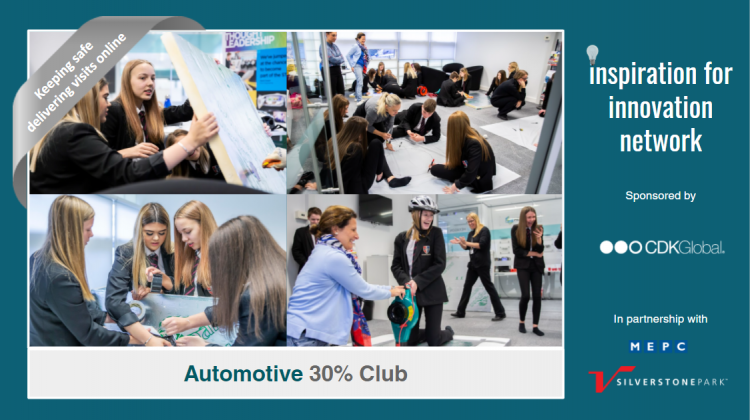Stereotyping means all does not equate in maths
 Working with the Automotive 30% Club Inspiration for Innovation Network has really opened my eyes to, and sometimes, really released a great sense of injustice in me when I look back at what I perceived to be a balanced and fair system of education from whence I came.
Working with the Automotive 30% Club Inspiration for Innovation Network has really opened my eyes to, and sometimes, really released a great sense of injustice in me when I look back at what I perceived to be a balanced and fair system of education from whence I came.
Not only that but the blatant tardiness for change over decades within the framework of our education system seems to me almost incomprehensible. Any advocate for equality should really be concerned about the unwitting oppression of female capability that is still being filtered into our next generations; where the stereotypes are so strong that they override the evidence, so that even where a girl’s performance on these tests is objectively excellent, they are not perceived as such.
The authors of this particular paper [1] were concerned with the underlying question of what shapes the assessment of children’s mathematical ability. The pinpoint focus was on the perception of parents’ and teachers’ of that ability in the context of children’s attainment (measured using standardised mathematics tests). The paper suggests that such perceptions may reflect the impact of gender stereotypes, that is, underestimating girls’ achievements and overestimating boys’ achievements in the area. As early as nine years old, girls’ performance at mathematics is being underestimated by both primary teachers and primary caregivers relative to boys’. The subsequent performance in mathematics by girls is therefore concerning especially for their academic self-concept in a society where maths is valued highly as an intelligence indicator.
During the Covid-19 pandemic where there has been a move toward teacher assessed grading in many educational systems it is exceptionally important therefore that we understand and challenge this gender-stereotyping by both parents and teachers alike.
In the study of over 8,500 nine-year-olds, robust evidence is revealed that both teachers and primary caregivers over-estimate boys’ performance. There is a strong reluctance for parents to rate high performing daughters as excellent, and this is systematic. Relative to boys of similar ability, girls are underrated.
So, how does this relate to what we are trying to achieve via the Automotive 30% Club Inspiration for Innovation (I4I) Network?
Maths is seen as central to pursuing highly valued careers in Science, Technology, Engineering and Mathematics (STEM). Even via frequent calls for girls to consider STEM careers, in the context of the above information, this is likely to be ineffective; girls from as young as nine years old are having their excellent behaviour in maths undermined by the biased perception that they are not excelling. This leads to demotivation in some cases and a lower self-value of their achievements by the girls. The report speculates that girls may therefore feel that they are better off pursuing careers which have a better fit with existing gender stereotypes, hence, in many cases perpetuating their position in less well paid and personally satisfying jobs.
Throughout the activities curated by the I4I Network, the intention is always to bring relatable ‘real models’ to share their personal experiences with youngsters. We are striving to engage our students with female apprentices, female engineering graduates and female engineers from the world of work so that those children, girls and boys alike, can recognise that they are, and can be capable of, overcoming society’s perception of what a mathematician or engineer actually looks like.
Another important message is for our younger generation to be aware of the summary points of this type of research so that they can be exposed to the barriers that they may face. Throughout the Automotive 30% Club Inspiration for Innovation activities, we refer to and use such important research as this carried out by Selina McCoy & Delma Byrne & Pat O Connor, 2020. We do this by including the knowledge into conversations and presentations in a way that can be brought to life for our students.
Weaving some of the important key facts into panel session conversations and discussing how successful female individuals involved in STEM-related careers have overcome these barriers is a crucial step, and one of many, that we must continue to bring to the forefront of education to ensure that we dispel these gender-based misconceptions, especially in regard to girls’ ability in maths. This we hope will help strengthen the attitudes of all of our talented next generation, and give them a better chance at a level playing field, until that level playing field actually becomes a consistent and continued reality.
If you are an Automotive 30% Club member or a tenant of Silverstone Park or the STC and wish to become part of our Inspiration for Innovation Network volunteer initiative, please simply email Danielle@automotive30Club.co.uk.
Article by – Danielle Humphreys, Inspiration for Innovation Network Manager
Source(s)
[1] Selina McCoy & Delma Byrne & Pat O Connor, 2020. “Gender Stereotyping in Parents’ and Teachers’ Perceptions of Boys’ and Girls’ Mathematics Performance in Ireland,” Working Papers 202010, Geary Institute, University College Dublin.
https://www.educationandemployers.org/research/gender-stereotyping-in-parents-and-teachers-perceptions-of-boys-and-girls-mathematics-performance-in-ireland/
